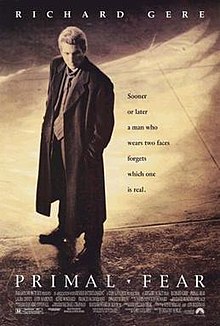Primal Fear (film)
| Primal Fear | |
|---|---|

Theatrical release poster
|
|
| Directed by | Gregory Hoblit |
| Produced by |
Gary Lucchesi Howard W. Koch, Jr. |
| Screenplay by | Steve Shagan Ann Biderman |
| Based on |
Primal Fear by William Diehl |
| Starring | |
| Music by | James Newton Howard |
| Cinematography | Michael Chapman |
| Edited by | David Rosenbloom |
|
Production
company |
|
| Distributed by | Paramount Pictures |
|
Release date
|
|
|
Running time
|
130 minutes |
| Country | United States |
| Language | English |
| Budget | $30 million |
| Box office | $102.6 million |
Primal Fear is a 1996 American neo-noir crime-thriller film, based on William Diehl's 1993 novel of the same name and directed by Gregory Hoblit.
The film tells the story of a Chicago defense attorney who believes his altar boy client is not guilty of murdering an influential Catholic Archbishop.
Primal Fear was a box office success and earned mostly positive reviews, with Edward Norton making a strong showing in his film debut. He was nominated for an Academy Award for Best Supporting Actor and won a Golden Globe Award for Best Supporting Actor – Motion Picture.
Martin Vail is a Chicago defense attorney who loves the public spotlight and does everything he can to get his high-profile clients acquitted on legal technicalities. One day, he sees a news report about the arrest of Aaron Stampler, a young altar boy from Kentucky with a severe stutter, who is accused of brutally murdering the beloved Archbishop Rushman. Vail jumps at the chance to represent the young man pro bono.
During his meetings at the county jail with Aaron Stampler, Vail comes to believe that his client is innocent, much to the chagrin of the prosecutor (and Vail's former lover), Janet Venable.
As the murder trial begins, Vail discovers that powerful civic leaders, including the corrupt state's attorney John Shaughnessy, have lost millions of dollars in real estate investments due to a decision by the Archbishop not to develop on certain church lands. The Archbishop received numerous death threats as a result. Following a tip from a former altar boy about a videotape involving Aaron Stampler, Vail makes a search of the Archbishop's apartment and finds a VHS tape of Stampler being forced to perform in a sexual act with another altar boy and a girl named Linda. Vail is now in a dilemma: introducing this evidence would make Stampler more sympathetic to the jury, but it would also give his client a motive for the murder, which Venable is unable to establish.
...
Wikipedia
